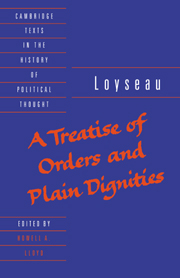Book contents
- Frontmatter
- Contents
- Acknowledgements
- Introduction
- Principal events in Loyseau's life
- Bibliographical note
- Note on translation and citations
- List of abbreviations
- Biographical notes
- Dedicatory epistle: Charles Loyseau to the Honourable Jean Forget
- Preface
- 1 Of order in general
- 2 Of the Roman orders
- 3 Of the order of the clergy
- 4 Of the order of nobility in general
- 5 Of plain gentlemen
- 6 Of the high nobility
- 7 Of princes
- 8 Of the third estate
- 9 Of solemn deprivation of order
- 10 Of the plain dignities of Rome
- 11 Of the plain dignities of France
- Index
- Title in the Series
11 - Of the plain dignities of France
Published online by Cambridge University Press: 05 June 2012
- Frontmatter
- Contents
- Acknowledgements
- Introduction
- Principal events in Loyseau's life
- Bibliographical note
- Note on translation and citations
- List of abbreviations
- Biographical notes
- Dedicatory epistle: Charles Loyseau to the Honourable Jean Forget
- Preface
- 1 Of order in general
- 2 Of the Roman orders
- 3 Of the order of the clergy
- 4 Of the order of nobility in general
- 5 Of plain gentlemen
- 6 Of the high nobility
- 7 Of princes
- 8 Of the third estate
- 9 Of solemn deprivation of order
- 10 Of the plain dignities of Rome
- 11 Of the plain dignities of France
- Index
- Title in the Series
Summary
1. I remember that in my youth, at the time of the death of the late Monsieur the Chancellor de Birague, it was said that he had died a cardinal without title, a chancellor without seals, a bishop without a diocese, a knight without an order, and a priest without a benefice. I do not know whether this was true, and I say it not in order to carp at his memory, but rather to honour him for not having aggrandised himself further by means of such dignities. Yet this common saying can serve us as a notable example of the honorary dignities of France. For, while we do not have quite as many of them as there were at the end of the Eastern Empire, we do have some, in the shape of offices, orders and even lordships.
2. Let us begin with orders, and indeed with ecclesiastical orders. It is true enough that there are not only cardinals of Rome without title, as I said earlier, but also certain cathedral churches whose canons are called cardinals – to wit, those of Ravenna and Compostella, according to Duaren.
3. Admittedly, in one gloss the cardinals of Ravenna are derisively compared with the king of Yvetot in France. However, it is also true that priests having leave of the incumbents to officiate for them in cathedral churches (whom we now call canons) were formerly called cardinals – that is, principals. And they are in cathedral churches what the cardinals of Rome are in the universal church.
- Type
- Chapter
- Information
- A Treatise of Orders and Plain Dignities , pp. 222 - 241Publisher: Cambridge University PressPrint publication year: 1994



